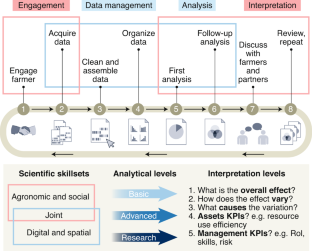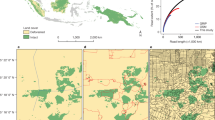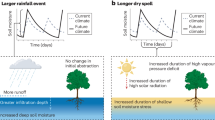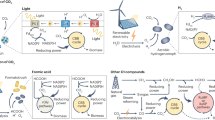Abstract
Restructuring farmer–researcher relationships and addressing complexity and uncertainty through joint exploration are at the heart of On-Farm Experimentation (OFE). OFE describes new approaches to agricultural research and innovation that are embedded in real-world farm management, and reflects new demands for decentralized and inclusive research that bridges sources of knowledge and fosters open innovation. Here we propose that OFE research could help to transform agriculture globally. We highlight the role of digitalization, which motivates and enables OFE by dramatically increasing scales and complexity when investigating agricultural challenges.
This is a preview of subscription content, access via your institution
Access options
Access Nature and 54 other Nature Portfolio journals
Get Nature+, our best-value online-access subscription
$29.99 / 30 days
cancel any time
Subscribe to this journal
Receive 12 digital issues and online access to articles
$119.00 per year
only $9.92 per issue
Buy this article
- Purchase on Springer Link
- Instant access to full article PDF
Prices may be subject to local taxes which are calculated during checkout




Similar content being viewed by others
References
Whitfield, S., Challinor, A. J. & Rees, R. M. Frontiers in climate smart food systems: outlining the research space. Front. Sustain. Food Syst. 2, https://doi.org/10.3389/fsufs.2018.00002 (2018).
Scoones, I. & Thompson, J. (eds) Farmer First Revisited: Innovation for Agricultural Research and Development 1st edn (Practical Action Publishing, 2009).
Stone, G. D. Towards a general theory of agricultural knowledge production: environmental, social, and didactic learning. Cult. Agric. Food Environ. 38, 5–17 (2016).
Hansson, S. O. Farmers’ experiments and scientific methodology. Euro. J. Phil. Sci. 9, 32 (2019).
Maat, H. & Glover, D. in Contested Agronomy: Agricultural Research in a Changing World (eds Sumberg, J. & Thompson, J.) 131–145 (Routledge, 2012).
Šūmane, S. et al. Local and farmers’ knowledge matters! How integrating informal and formal knowledge enhances sustainable and resilient agriculture. J. Rural Stud. 59, 232–241 (2018).
de Janvry, A., Sadoulet, E. & Rao, M. Adjusting Extension Models to the Way Farmers Learn Policy Brief No. 159 (FERDI, 2016).
Cross, R. & Ampt, P. Exploring agroecological sustainability: unearthing innovators and documenting a community of practice in Southeast Australia. Soc. Nat. Resour. 30, 585–600 (2016).
Rickards, L., Alexandra, J., Jolley, C., Farhey, K. & Frewer, T. Review of Agricultural Extension (ACIAR, 2019).
MacMillan, T. & Benton, T. G. Engage farmers in research. Nature 509, 25–27 (2014).
Waters-Bayer, A. et al. Exploring the impact of farmer-led research supported by civil society organisations. Agric. Food Secur. 4, 4 (2015).
Berthet, E. T. A., Barnaud, C., Girard, N., Labatut, J. & Martin, G. How to foster agroecological innovations? A comparison of participatory design methods. J. Environ. Plan. Manage. 59, 280–301 (2015).
Cook, S. et al. An on-farm experimental philosophy for farmer-centric digital innovation. In 14th International Conference on Precision Agriculture (ISPA, 2018).
Cook, S. E., Cock, J., Oberthür, T. & Fisher, M. On-farm experimentation. Better Crops 97, 17–20 (2013).
Richardson, M. et al. Farmer research networks in principle and practice. Int. J. Agric. Sustain. https://doi.org/10.1080/14735903.2021.1930954 (2021).
Thompson, L. J. et al. Farmers as researchers: in‐depth interviews to discern participant motivation and impact. Agron. J. 111, 2670–2680 (2019).
Sewell, A. M. et al. Hatching new ideas about herb pastures: learning together in a community of New Zealand farmers and agricultural scientists. Agric. Syst. 125, 63–73 (2014).
Bramley, R. G. V., Lawes, R. & Cook, S. in Precision Agriculture for Sustainability and Environmental Protection (eds Oliver, M. A., Bishop, T. F. A. & Marchant, B. M.) 205–218 (Routledge, 2013).
Marchant, B. et al. Establishing the precision and robustness of farmers’ crop experiments. Field Crops Res. 230, 31–45 (2019).
Briggs, J. Indigenous knowledge: a false dawn for development theory and practice? Progr. Dev. Stud. 13, 231–243 (2013).
Caron, P., Biénabe, E. & Hainzelin, E. Making transition towards ecological intensification of agriculture a reality: the gaps in and the role of scientific knowledge. Curr. Opin. Environ. Sustain. 8, 44–52 (2014).
Kool, H., Andersson, J. A. & Giller, K. E. Reproducibility and external validity of on-farm experimental research in Africa. Exp. Agric. 56, 587–607 (2020).
de Roo, N., Andersson, J. A. & Krupnik, T. J. On-farm trials for development impact? The organisation of research and the scaling of agricultural technologies. Exp. Agric. 55, 163–184 (2019).
Möhring, N. et al. Pathways for advancing pesticide policies. Nat. Food 1, 535–540 (2020).
Sylvester-Bradley, R. et al. Agronōmics: transforming crop science through digital technologies. Adv. Anim. Biosci. 8, 728–733 (2017).
Ruiz, J., Dumont, A. & Zingraff, V. in Penser le Gouvernement des Ressources Naturelles (eds Busca, D. & Lew, N.) 293–330 (Presses de l’Université Laval, 2019).
Fabregas, R., Kremer, M. & Schilbach, F. Realizing the potential of digital development: the case of agricultural advice. Science https://doi.org/10.1126/science.aay3038 (2019).
Dowd, A.-M. et al. The role of networks in transforming Australian agriculture. Nat. Clim. Change 4, 558–563 (2014).
Klerkx, L., van Mierlo, B. & Leeuwis, C. in Farming Systems Research into the 21st Century: The New Dynamic (eds Darnhofer, I., Gibbon, D. & Dedieu, B.) 457–483 (Springer, 2012).
Ingram, J., Gaskell, P., Mills, J. & Dwyer, J. How do we enact co-innovation with stakeholders in agricultural research projects? Managing the complex interplay between contextual and facilitation processes. J. Rural Stud. 78, 65–77 (2020).
Jackson, L. et al. Biodiversity and agricultural sustainagility: from assessment to adaptive management. Curr. Opin. Environ. Sustain. 2, 80–87 (2010).
Laurent, A., Kyveryga, P., Makowski, D. & Miguez, F. A framework for visualization and analysis of agronomic field trials from on‐farm research networks. Agron. J. 111, 2712–2723 (2019).
Kyveryga, P. M. On‐farm research: experimental approaches, analytical frameworks, case studies, and impact. Agron. J. 111, 2633–2635 (2019).
Tremblay, N. in Precision Agriculture for Sustainability (ed. Stafford, J.) 145–168 (Burleigh Dodds Science Limited, 2019); https://doi.org/10.1201/9781351114592
Bullock, D. S. et al. The data‐intensive farm management project: changing agronomic research through on‐farm precision experimentation. Agron. J. 111, 2736–2746 (2019).
Wyatt, J., Brown, T. & Carey, S. The next chapter in design for social innovation. Stanford Soc. Innov. Rev. 19, 40–47 (2021).
Griffin, T. W., Fitzgerald, G. J., Lowenberg‐DeBoer, J. & Barnes, E. M. Modeling local and global spatial correlation in field‐scale experiments. Agron. J. https://doi.org/10.1002/agj2.20266 (2020).
Coudel, E., Tonneau, J.-P. & Rey-Valette, H. Diverse approaches to learning in rural and development studies: review of the literature from the perspective of action learning. Knowl. Manage. Res. Pract. 9, 120–135 (2017).
Browning, D. M. et al. Emerging technological and cultural shifts advancing drylands research and management. Front. Ecol. Environ. 13, 52–60 (2015).
Maxwell, B. et al. Can optimization associated with on-farm experimentation using site-specific technologies improve producer management decisions? In 14th International Conference on Precision Agriculture (2018).
Kindred, D. et al. Supporting and analysing on-farm nitrogen tramline trials so farmers, industry, agronomists and scientists can learn together. In 14th International Conference on Precision Agriculture (2018).
Oberthür, T. et al. Plantation intelligence applied oil palm operations: unlocking value by analysing commercial data. Planter 93, 339–351 (2017).
Jin, H., Shuvo Bakar, K., Henderson, B. L., Bramley, R. G. V. & Gobbett, D. L. An efficient geostatistical analysis tool for on-farm experiments targeted at localised treatment. Biosys. Eng. 205, 121–136 (2021).
Berthet, E. T., Hickey, G. M. & Klerkx, L. Opening design and innovation processes in agriculture: insights from design and management sciences and future directions. Agric. Syst. 165, 111–115 (2018).
Curley, M. Twelve principles for open innovation 2.0. Nature 533, 315–316 (2016).
Ryan, S. F. et al. The role of citizen science in addressing grand challenges in food and agriculture research. Proc. Biol. Sci. 285, 20181977 (2018).
Herrero, M. et al. Innovation can accelerate the transition towards a sustainable food system. Nat. Food 1, 266–272 (2020).
Fielke, S. J. et al. Conceptualising the DAIS: implications of the ‘digitalisation of agricultural innovation systems’ on technology and policy at multiple levels. NJAS 90–91, 100296 (2019).
Cook, S., Jackson, E. L., Fisher, M. J., Baker, D. & Diepeveen, D. Embedding digital agriculture into sustainable Australian food systems: pathways and pitfalls to value creation. Int. J. Agric. Sustain. https://doi.org/10.1080/14735903.2021.1937881 (2021).
van Etten, J. et al. Crop variety management for climate adaptation supported by citizen science. Proc. Natl Acad. Sci. USA 116, 4194–4199 (2019).
Ingram, J. & Maye, D. What are the implications of digitalisation for agricultural knowledge? Front. Sustain. Food Syst. 4, https://doi.org/10.3389/fsufs.2020.00066 (2020).
McNee, M. Government Support for Farmer-Based Research in the Falkland Islands AAC Agenda 07.11.2019, Item 10 (Agricultural Advisory Committee, Falkland Islands Government, 2019).
Zhang, W. et al. Closing yield gaps in China by empowering smallholder farmers. Nature 537, 671–674 (2016).
Lechenet, M., Dessaint, F., Py, G., Makowski, D. & Munier-Jolain, N. Reducing pesticide use while preserving crop productivity and profitability on arable farms. Nat. Plants 3, 17008 (2017).
García, F. et al. La Red de Nutrición de la Región Crea Sur de Santa Fe: Resultados y Conclusiones de los Primeros Diez Años 2000-2009 (AACREA, 2010).
Posner, S. M., McKenzie, E. & Ricketts, T. H. Policy impacts of ecosystem services knowledge. Proc. Natl. Acad Sci. USA 113, 1760–1765 (2016).
Moore, M.-L., Riddell, D. & Vocisano, D. Scaling out, scaling up, scaling deep. Strategies of non-profits in advancing systemic social innovation. J. Corp. Citizenship 58, 67–84 (2015).
Payan, J.‐C. & Pichon, L. ApeX‐Vigne, Version 2020: Une Application Mobile Gratuite pour Faciliter le Suivi de la Croissance des Vignes et Estimer la Contrainte Hydrique (Institut Français de la Vigne et du Vin and Institut Agro, Montpellier SupAgro, 2020).
Samberg, L. H. A collaboration worth its weight in grain. Nature 537, 624–625 (2016).
Acknowledgements
This study was funded by the Premier’s Agriculture and Food Fellowship Program of Western Australia. This Fellowship is a collaboration between Curtin and Murdoch Universities and the State Government. The Fellowship is the centrepiece of the Science and Agribusiness Connect initiative, made possible by the State Government’s Royalties for Regions program. Additional support was provided by the MAK’IT-FIAS Fellowship programme (Montpellier Advanced Knowledge Institute on Transitions – French Institutes for Advanced Study) co-funded by the University of Montpellier and the European Union’s Horizon 2020 Marie Skłodowska-Curie Actions (co-fund grant agreement no. 945408), the Digital Agriculture Convergence Lab #DigitAg (grant no. ANR-16-CONV-0004) supported by ANR/PIA, and the Elizabeth Creak Charitable Trust. Contributions toward enabling workshops were made by the USDA (USDA AFRI FACT Los Angeles 2017), the International Society for Precision Agriculture (ICPA Montreal 2018 OFE-C, On-Farm Experimentation Community), the National Key Research and Development Program of China (2016YFD0201303) and ADAS (Cambridge 2018), the European Conference for Precision Agriculture (ECPA Montpellier 2019) and the OECD Co-operative Research Program for ‘Biological resource management for sustainable agricultural systems – Transformational technologies and innovation’ towards ‘#OFE2021, the first Conference on farmer-centric On-Farm Experimentation – Digital Tools for a Scalable Transformative Pathway’. L. Tresh assisted with the design and preparation of Figs. 2 and 3. Members of the #OFE2021 Working Groups also contributed their experiences and insights.
Author information
Authors and Affiliations
Contributions
M.L. and S.C. developed the study concept. M.M., D.G., J.I., V.B.-M., T.M., R.S.-B. and A.H. contributed additional concept development. M.L. and D.G. obtained the data and prepared the results. M.L., M.M., L.T., D.K., F.O.G., B.M., V.B.-M., J.R., C.H. and W.Z. contributed data. M.L. wrote the manuscript with input from all other authors.
Corresponding author
Ethics declarations
Competing interests
The authors declare no competing interests.
Additional information
Peer review information Nature Food thanks Carol Shennan, Petro Kyveryga, Nicolas Martin and the other, anonymous, reviewer(s) for their contribution to the peer review of this work.
Publisher’s note Springer Nature remains neutral with regard to jurisdictional claims in published maps and institutional affiliations.
Supplementary information
Supplementary Information
Sources for Figs. 1–3.
Rights and permissions
About this article
Cite this article
Lacoste, M., Cook, S., McNee, M. et al. On-Farm Experimentation to transform global agriculture. Nat Food 3, 11–18 (2022). https://doi.org/10.1038/s43016-021-00424-4
Received:
Accepted:
Published:
Issue Date:
DOI: https://doi.org/10.1038/s43016-021-00424-4
This article is cited by
-
Can machine learning models provide accurate fertilizer recommendations?
Precision Agriculture (2024)
-
Digital strategies for nitrogen management in grain production systems: lessons from multi-method assessment using on-farm experimentation
Precision Agriculture (2024)
-
Fully Bayesian economically optimal design for a spatially varying coefficient linear stochastic plateau model over multiple years
Stochastic Environmental Research and Risk Assessment (2024)
-
Analytic transparency is key for reproducibility of agricultural research
CABI Agriculture and Bioscience (2023)
-
Pesticide reduction amidst food and feed security concerns in Europe
Nature Food (2023)



